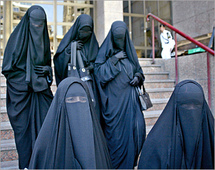Saudi women to attempt largest human ribbon
AFP
JEDDAH- Largely marginalised from public life, Saudi women will attempt to form the world's largest-ever human pink ribbon on Thursday to draw attention to breast cancer in the ultra-conservative kingdom.
Instead of the ubiquitous all-black, shroud-like abaya Saudi women are compelled to wear in public, organisers say they will don pink ponchos and scarves as they mass together in the shape of the global symbol of breast cancer awareness.

The organisers are aiming to get a turnout of 10,000 women in an education ministry stadium in the Red Sea city of Jeddah, far more than the previous record of 3,640 in Germany in 2007, they said.
If they succeed, they are likely to have set the standard for future gatherings of women in the kingdom and have crossed a major barrier to activism.
Even small rallies are rare in Saudi Arabia, where the government bans protests and restricts public activism.
Activism by women is even more difficult, because they cannot move around without the approval of a male guardian and are not permitted to drive.
Moreover, women have almost no high positions in government to advance their interests.
Only one woman serves as a minister -- the deputy minister of education -- and none are full members of the consultative Shura council.
The human ribbon attempt is being organised by the Riyadh-based Zahra Breast Cancer Association and promoted by the activist Princess Reema bint Bandar, daughter of Prince Bandar bin Sultan, the former Saudi ambassador to the United States.
"Let it be known that as of this day, ignorance is no longer an excuse and no woman should be allowed to be left to suffer in silence," Reema said at the launch of the awareness campaign which was to culminate in Thursday's rally.
Breast cancer is the most-diagnosed form of cancer in Saudi Arabia, accounting for 12.4 percent of all cancers and 23.6 percent of cancers among women, according to a study by the Saudi Cancer Registry.
A study published in the Annals of Saudi Medicine in August said that the incidence of breast cancer in the kingdom is relatively low.
However, it added: "Many women have no access to mammography due to racial, environmental, financial/ insurance barriers; lack of education; and, most importantly, lack of encouragement by a physician."
-----------------------------------------------------------------------